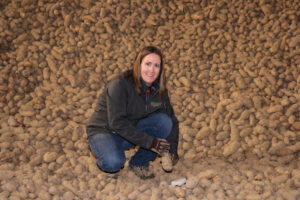Innovation Hubs
Cultivating sustainable practices
(Sponsored) Facing increased challenges such as climate change and rising input costs, growers must innovate and adapt to new agricultural practices. To combat these uncertainties, McCain Foods partners with growers to implement regenerative agriculture practices – building farmer resilience, enhancing soil health and increasing yields.
Erica Fitzpatrick Peabody, a partner in Fitzpatrick & Peabody Farms in Houlton, Maine, operates an Innovation Hub demonstration farm in partnership with McCain.
With Peabody’s past work as an agronomist, she has always been interested in the science of farming and how to properly apply science-based techniques to commercial agriculture. When McCain’s local field department started seeking new, innovative projects, Peabody thought of altering pesticide programs based on Environmental Impact Quotient (EIQ) values.

“All pesticide active ingredient chemistries are assigned a numerical EIQ value. The EIQ value is based on a formula that includes assessments of the environmental and health impacts of pesticides. The EIQ values can be used by growers to select pesticides based on their reduced toxicity to the environment, humans and consumers. Due to pest pressures (weeds, insects, disease), it is necessary to apply pesticides, but we can reduce our agrochemical impact with a greater focus on EIQ values,” Peabody explained.
For the 2024 growing season, Peabody has developed two pesticide programs focusing on EIQ values – a grower standard and a lower EIQ value program. Peabody can compare the costs of pesticide programs based on EIQ values.
“It is often difficult to place a value or cost on cover cropping, increasing organic matter and more, but the cost of this project is easier to place a value on,” Peabody said. “We may need to adapt our program as every growing season is different but we are up for the challenge.”
Like every grower, Peabody understands the importance of soil health. At Fitzpatrick & Peabody Farms, they have utilized cover crops in rotation for nearly 20 years. Their cover crop mixes vary but always include ryegrass. Ryegrass returns carbon to the soil, ultimately benefiting the crop.
“One of our greatest resources is our soil and how we take care of that soil has a significant impact on our crop tonnage and quality,” Peabody asserted.
In addition to utilizing cover crops, Peabody takes part in grid soil sampling.
“We believe that grid soil sampling is important for building soil prescriptions to variable rate apply nutrients,” Peabody said. “Variable rate application is more accurate in targeting the application of nutrients, which costs less, is better for the environment, improves crop quality and much more.”
Peabody also utilizes disease forecasting tools to determine when to spray for potato diseases.
“We are fine-tuning new generation systems which analyze the weather forecast and the fungicide product last applied. Certain chemistries may have a longer residual impact and require less frequent application while considering the stage of crop growth,” Peabody said.
The world of agriculture is constantly evolving into newer and more sustainable practices. Peabody believes growers will continue armoring their soils with more organic matter, greater diversity, and reduced pesticide risk.
“I believe that growers, particularly potato growers, are always innovating and finding ways to grow better crops with less. Climate change is impacting everyone and potato growers will continue to adapt their farms to be more resilient. Potatoes are sustainable for the environment, people and communities.”
To learn more about McCain, visit www.mccain.com/sustainability/smart-sustainable-farming.
© 2024 McCain







